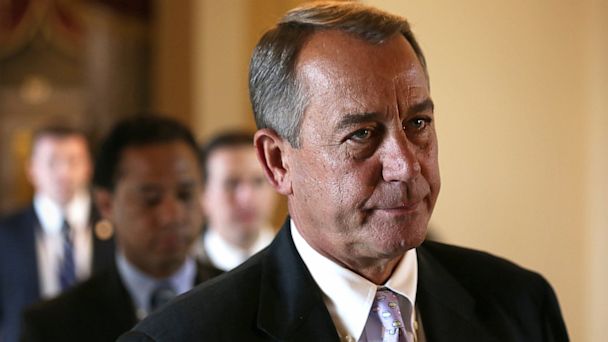Will John Boehner Risk His Job to Avoid a Government Shutdown?

Alex Wong/Getty Images
ANALYSIS By RICK KLEIN @rickklein
If the goal is to avoid a government shutdown that all sides agree would be mostly pointless and ultimately expensive, House Speaker John Boehner has a simple way out.
All Boehner would have to do is bring the Senate-passed bill keeping government funding flowing - including funding for Obamacare - up for a vote in the House. A huge chunk of Democrats would join a relative handful of moderate and leadership-loyal Republicans, and the latest shutdown showdown would be over well before midnight.
But such a move, taken right now, could easily turn out to be the last substantial thing Boehner did as House speaker. That's one reason it's highly unlikely to happen, based on Boehner's history of leading his restive conference, and the current political dynamics on Capitol Hill.
Boehner is on record saying he does not want a government shutdown. He's also on record - though he quickly modified his remarks, amid fierce blowback - as saying that battles over Obamacare were largely settled with the 2012 elections.
As House speaker, though, Boehner has sought to lead from the middle of the pack. He's worked to reflect the will of his Republican colleagues - pushing what's good for the party only when he's convinced that most of his members ultimately agree, and even if they aren't necessarily voting that way.
"He's leading by what the consensus of the conference is - and that is at the risk of public approval of the Republican Party," said Ron Bonjean, a Republican strategist and former top aide to House Speaker Dennis Hastert. "You'll see him staying the course with the Republican conference, doing what they want him to do."
That suggests Boehner will resist taunts from Democrats and not bring a "clean" funding bill to the floor of the House today. But it doesn't suggest a protracted shutdown is in the offing.
Boehner, who is among the few major players in this drama who was on Capitol Hill for the last government shutdown, knows there's no good long-term play for his party in having this dragged out.
In three notable occasions as speaker - around the fiscal cliff debate, Sandy storm relief, and extending the Violence Against Women Act - Boehner has gone against a majority of his own conference and relied on Democrats to get something major done.
Boehner survived each of those episodes for an important reason: Most of his colleagues realized, at least privately, that he was doing what was right for the greater good of the party. He didn't act too quickly, or before his GOP colleagues were largely ready for him to act.
To that point, it's worth paying attention to efforts that have begun among rank-and-file Republicans to walk the party back from this brink.
"There are a very large number of House Republicans who privately support a clean CR, but fewer who are willing to vote for it," Rep. Charlie Dent, R-Pa., told The Washington Post's Greg Sargent today. "I believe most House Republican members would be okay with John Boehner if he were to decide to allow a vote."
Layer on top of this another reality: It's not clear who else could even be elected House speaker in this divided conference, much less lead more effectively. The tea party members involved in the haphazard - though almost successful - effort to keep Boehner from another term after the election continue to appeal to too narrow a slice of Republicans to be elected speaker.
House Majority Leader Eric Cantor and House Budget Chairman Paul Ryan have been discussed as possible speakers, but neither would be a natural choice in a coup scenario. Even if they wanted the job, their candidacies have some of the same perceived flaws that Boehner exhibits.
So Boehner will continue to lead the House, for all that means in the current environment. There may be a time where he's willing to sacrifice his speakership for a greater good. This is not that time.